1 March 2003
Nevis , Saba, St Eustatius & St Kitts N 17.0912 W 62.3782
"The Islands That Brush the Clouds"
They trudged on one step after another. Minds deprived of oxygen fantasizing of warm climates. Their gear was starting to fail them as the chill cut through the clothing making the perspiration lower their body temperature even further. There were no oxygen bottles left. One step after another, ten steps then rest to replete the oxygen, this is their system, one step after another, ten steps and then rest to replete the oxygen. They knew the routine they had to follow in order to make the summit. Achieving the summit would provide great exhilaration but that success can sometimes lead to real danger descending back to base camp, in this case Y2.
They had both sacrificed a great deal to participate in the climb. Long separation from family, many months of training and conditioning which could all be thwarted by altitude sickness. One step after another, ten steps and then rest to replete oxygen. Their legs trembled with each step and one would look at the other to check their condition. Lungs bursting starved for oxygen made the monochrome color of the landscape dizzying. They looked at each other and nodded in agreement that the summit was achievable.
And now for the rest of the story.....................
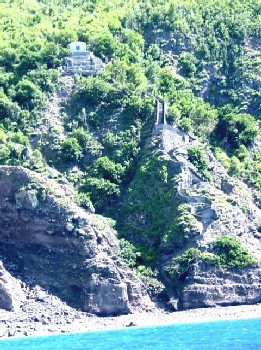
(Long pause) I've spent thirty years avoiding Paul Harvey and that cliché but Paul is on the Armed Forces Radio Network where we listen to NPR. That's where we get our daily dose of what is really happening in the world.
Why do men and women climb mountains is an often asked question and there can be only one explanation. Somewhere in the helix of the DNA that is the building block of human life is a chromosome that compels human kind to take a picture from the top. So you now know it's not Sir Edmund Hillary and his Sherpa guide Tenzing Norgay but rather Steve and Rene spending one and a half hours trudging to the summit of the volcanic mountain of Saba reaching the Cable and Wireless tower at 3000 feet and a spectacular view. The top is covered with an Elfin forest something only my nephew Nick could understand and appreciate.
Saba is an interesting isle since it's almost impossible to get to. It has no port 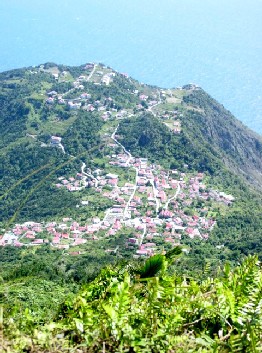 as you can tell from the old customs house that is 800 steep steps above sea level. It reminds one of Saint Helena where Napoleon spent his last days. And yet Sabaens carved out a quaint existence on this forbidding volcanic rock. To land on the island we moored on one of the six mooring buoys in a newly developed Saba National Marine Park. There was never more than one other visiting boat in this area. It's a two mile dinghy ride to the port facility if you can call it that. It appears that hurricane Lenny did some major damage. We have seen restaurants with bigger docks and better protection. The ride to the port started with a slight chop but when we turned the corner there was another cruising lesson awaiting us, never take an eight foot dinghy into seven foot seas. We were hammered regardless of the speed and soaked upon arrival. The seas were crashing in so we couldn't make it to the dinghy dock and the port master told us to leave the dinghy next to the RoRo dock. On the trip back later that day we were surfing down waves that made the bow point to the bottom while waves broke over our heads. as you can tell from the old customs house that is 800 steep steps above sea level. It reminds one of Saint Helena where Napoleon spent his last days. And yet Sabaens carved out a quaint existence on this forbidding volcanic rock. To land on the island we moored on one of the six mooring buoys in a newly developed Saba National Marine Park. There was never more than one other visiting boat in this area. It's a two mile dinghy ride to the port facility if you can call it that. It appears that hurricane Lenny did some major damage. We have seen restaurants with bigger docks and better protection. The ride to the port started with a slight chop but when we turned the corner there was another cruising lesson awaiting us, never take an eight foot dinghy into seven foot seas. We were hammered regardless of the speed and soaked upon arrival. The seas were crashing in so we couldn't make it to the dinghy dock and the port master told us to leave the dinghy next to the RoRo dock. On the trip back later that day we were surfing down waves that made the bow point to the bottom while waves broke over our heads.
Sylvester, our taxi driver, gave us a quick tour of the island and in no time we had visited all four villages. He then dropped us off in the village of Windward side for our moronic climb . The taxi ride was on "the road that couldn't be built". It seems that Dutch engineers surveyed Saba and declared that roads could not be built on such steep terrain. One industrious Sabaen, Josephus Hassell took a correspondence course on road building and today there is a system of roads in testimony to the hard working indigenous population. The road is very narrow and in some places extremely steep. 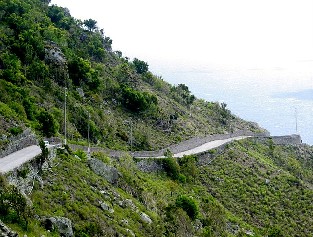 You really need to be on the island to appreciate it. The Sabans did the same for the airport. Once again the Dutch engineers were very disparaging about the idea of an airport. The Sabans brought in a pilot from St Barts, Remy de Haenen, to look over the one flat rock and he thought landing might be possible. So the Sabans flattened the area as much as possible by hand, removing big rocks and filling in holes. Remy landed and today they have a small airport. They named that part of the island Hells Gate and from the top of the island looking down the name seemed to be appropriate. The island is part of the Dutch West Indies or more property the Netherlands Antilles and in recent years has built a thriving scuba diving industry. Since no one really vacations here a great abundance of marine life is found in the surrounding sea. Diving requires a guide thereby helping in the balance of trade for Saba. The second largest industry is medical education. The 250 students of the Saba International School of Medicine comprise 17% of the population of 1400. All the students are from the US but have you ever seen a medical diploma from the Saba International School of Medicine? You really need to be on the island to appreciate it. The Sabans did the same for the airport. Once again the Dutch engineers were very disparaging about the idea of an airport. The Sabans brought in a pilot from St Barts, Remy de Haenen, to look over the one flat rock and he thought landing might be possible. So the Sabans flattened the area as much as possible by hand, removing big rocks and filling in holes. Remy landed and today they have a small airport. They named that part of the island Hells Gate and from the top of the island looking down the name seemed to be appropriate. The island is part of the Dutch West Indies or more property the Netherlands Antilles and in recent years has built a thriving scuba diving industry. Since no one really vacations here a great abundance of marine life is found in the surrounding sea. Diving requires a guide thereby helping in the balance of trade for Saba. The second largest industry is medical education. The 250 students of the Saba International School of Medicine comprise 17% of the population of 1400. All the students are from the US but have you ever seen a medical diploma from the Saba International School of Medicine?
A high pressure gradient continues to linger in the north east Caribbean making for another day of nine foot waves and 25 knot winds. 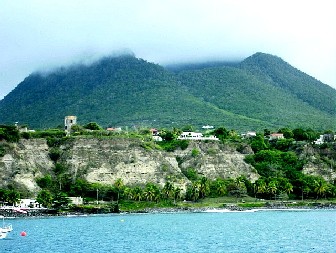 The winds were on the nose so we motored on the next leg saving me the trouble of working the foredeck in breaking waves and saving three or four extra hours if we were tacking instead of just five hours of motoring. We arrived at St Eustatius, Statia for short, and made our way to the village of this Dutch controlled island which was once the center of commerce for the Caribbean. It's legalized black market activities created a wealthy populace until they pissed off a Brit, by the name of Admiral Rodney, for recognizing the then fledging US government . To get to the village we walked up the mountain via the "Slave Path" to see what Statia is all about. The winds were on the nose so we motored on the next leg saving me the trouble of working the foredeck in breaking waves and saving three or four extra hours if we were tacking instead of just five hours of motoring. We arrived at St Eustatius, Statia for short, and made our way to the village of this Dutch controlled island which was once the center of commerce for the Caribbean. It's legalized black market activities created a wealthy populace until they pissed off a Brit, by the name of Admiral Rodney, for recognizing the then fledging US government . To get to the village we walked up the mountain via the "Slave Path" to see what Statia is all about.
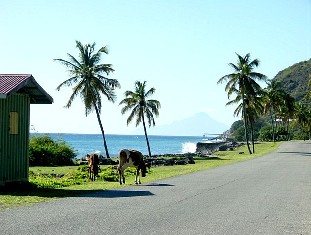
Today the island has a run down appearance intermingled among a crumbling historic fort and hurricane damaged ruins from years gone by. The population is approximately 1600 and guess what the medical school comprises 17% of the head count. Fifty ethnic Chinese add to the population staffing six Chinese restaurants and we can attest to the authenticity of one. Statia has the highest of the volcanic peaks in the region that is called "the islands that brush the clouds". No thanks, we pulled up anchor early the next morning and headed for St Christopher, or St Kitts for short. Nice the way all these islands have nick names.
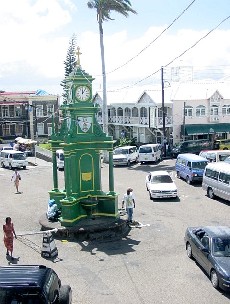
St Kitts has no real protected anchorages either. We are anchored in Basseterre which is the capital and the site of the original French settlement. We are close to the commercial dock and last night at 2:00 AM a freighter docked close by with a great deal of noise and lights. Also the anchorage is open to the south and the swells come in due to the current high pressure. The only comfort we get is to look out and see the monohulls careening from side to side. Catamarans are extremely stable in these types of anchorages despite our complaints. The front is passing, the sea states are calming down, and things are returning to normal. Checking in the next morning we were told that the customs lady was not in just then and we were asked to have an enjoyable day but to return tomorrow. We dinghied to the center of town and it was another wet ride. Any dinghy ride can give you a condition that we jokingly call "dinghy butt". This is when you sit in salt water in the dinghy and walk around the island with a wet butt.
One nice thing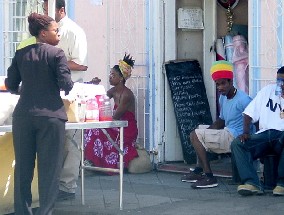 about St. Kitts is that you don't have to hike to get to the village. The lower part of the island is green and sloping and they are currently harvesting sugar cane. Basseterre was largely rebuilt after a fire in 1876, and The Circus is "modeled after" (and I use that term loosely) Piccadilly in London. Restaurants and roadside vendors abound. about St. Kitts is that you don't have to hike to get to the village. The lower part of the island is green and sloping and they are currently harvesting sugar cane. Basseterre was largely rebuilt after a fire in 1876, and The Circus is "modeled after" (and I use that term loosely) Piccadilly in London. Restaurants and roadside vendors abound.
Chilled coconut milk appeared to be the drink of choice.
Brad had promptly sent our mail and we are working on our taxes. On the other hand Raymarine did not send our computer in a timely manner an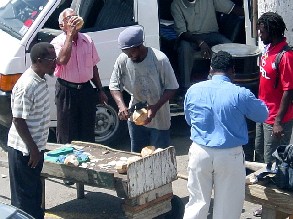 d we will have to wait for its arrival. It seems that the auto pilot computer we replaced in the BVI was repairable after all. We sent it back to Raymarine in New Hampshire and they fixed it for a modest sum. So now we will have a backup and while they were fixing it they of course upgraded it. d we will have to wait for its arrival. It seems that the auto pilot computer we replaced in the BVI was repairable after all. We sent it back to Raymarine in New Hampshire and they fixed it for a modest sum. So now we will have a backup and while they were fixing it they of course upgraded it.
We will try a few more anchorages here in St. Kitts that are not so commercial while waiting on our FedEx package and then on to Nevis, the last stop of our visit to "The Islands That Brush the Clouds". Montserrat is off of our list because of an active volcano that is erupting and spreading ash all around. Hot ash is not good for any boats' sails.
5 March 2003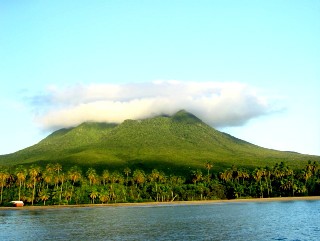
Nevis N 17.0912 W 62.3872
Someplaces make you feel right at home
It is with great regret than we leave Nevis before independence is won.
We arrived here anticipating another volcanic island with no beaches and a run down city center but instead we found the beginning of a new democracy. We anchored at Pinney's Bay which is a beautiful three mile beach running in front of the Four Seasons Resort. The bottom is all sand and we share the anchorage with five or six other boats on any given night. We received a boat pass to visit Nevis when we were in St Kitts since the two islands are one country with St Kitts being the capital. You may remember a few logs back we visited Anguilla which broke free from St. Kittian rule after "the revolution" of 1967. We went into Charleston to inform customs of our arrival but since it was Friday and past noon, customs would not be open until Monday. We strolled around town and to our surprise there on the main corner of town in the downtown commercial district we discovered E & H Slack's Liquor Store the cornerstone of Nevisian society. In the store was a plethora of relatives watching the international cricket matches being broadcast on 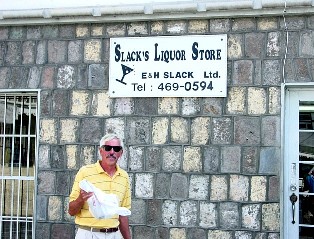 ESPN 7 or something like that. After introducing ourselves and chatting about family matters, you know how those conversations go " now are you from the Jack Slack side of the family from Manchester England or the Lavonne Slack side from Guyana". Well we never did decide but we found a new bottle of rum and got the family discount price. We continued our stroll down the street and low and behold the Slack Grocery Store. An idea was starting to formulate in my mind as we introduced ourselves to more relatives. Next it was on to the Slack Hardware Store. Although the sign had fallen down during Hurricane Luis in 1995 the people inside assured us this was the original Slack Hardware. It was evidently so successful that the owner was on holiday and the store was being run by the help. ESPN 7 or something like that. After introducing ourselves and chatting about family matters, you know how those conversations go " now are you from the Jack Slack side of the family from Manchester England or the Lavonne Slack side from Guyana". Well we never did decide but we found a new bottle of rum and got the family discount price. We continued our stroll down the street and low and behold the Slack Grocery Store. An idea was starting to formulate in my mind as we introduced ourselves to more relatives. Next it was on to the Slack Hardware Store. Although the sign had fallen down during Hurricane Luis in 1995 the people inside assured us this was the original Slack Hardware. It was evidently so successful that the owner was on holiday and the store was being run by the help.
Why should all these relatives put up with the oppressive rule of the St Kittians. The Anguillians were able to win their freedom why shouldn't we break free and form our own country. With a population of 12,000 we have visions of becoming the 190th member of the UN and how about membership in NAFTA. A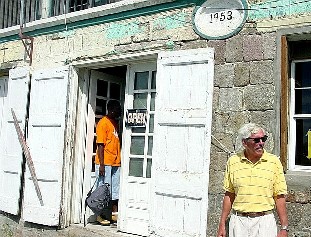 little foreign aid from Ethiopia, increase the tax rate to the Four Seasons and we would be solvent in no time. Why Ethiopia you might ask. Well it's the Bob Marley connection. It appears that a significant community of Rastafarian live in Nevis as it once was called (a new name is soon to be developed). We could have a delegation go to Ethiopia where Haile Salassie was once King of Ethiopia and a spiritual leader of the Rastafarianism and friend of Bob Marley. Certainly the current government of Ethiopia would see the connection and want to help. If we went to the US for aid, we would be required to fill out a truck load of forms and since there are almost no computers in Nevis it would take forever to receive dollar one and as soon as we did there would be a Sam's Club and goodbye Slack's Liquor, Slack's Groceries and Slack's Hardware and the family discount. little foreign aid from Ethiopia, increase the tax rate to the Four Seasons and we would be solvent in no time. Why Ethiopia you might ask. Well it's the Bob Marley connection. It appears that a significant community of Rastafarian live in Nevis as it once was called (a new name is soon to be developed). We could have a delegation go to Ethiopia where Haile Salassie was once King of Ethiopia and a spiritual leader of the Rastafarianism and friend of Bob Marley. Certainly the current government of Ethiopia would see the connection and want to help. If we went to the US for aid, we would be required to fill out a truck load of forms and since there are almost no computers in Nevis it would take forever to receive dollar one and as soon as we did there would be a Sam's Club and goodbye Slack's Liquor, Slack's Groceries and Slack's Hardware and the family discount.
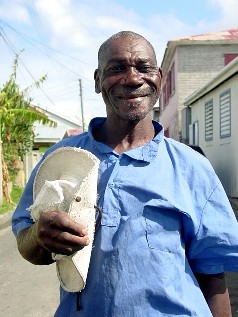
This old soldier was keen on becoming, The Chairman of the Joint Chiefs, of the new Armed Forces. Over a pint in a brown bag, we discussed our plans on eliminating the Coast Guard boat from St. Kitts, I didn't understand his dialect very well but I think that's what he was talking about. As we discussed our plan he led us to the fish market where we purchased four very nice King Fish fillets and surveyed the fishing fleet of twenty foot open boats. These boats would be an important element in our defense of Nevis if the Kittians wanted an armed conflict.
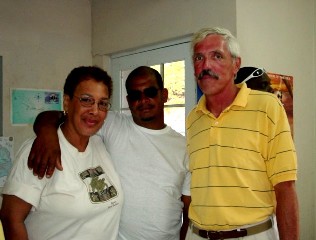
It's not for me that this idea has now become the talk of all Nevis. Oh certainly if they called for me to serve in any capacity I would gladly welcome life as a public servant. But rather it is for the future of Nevis, the Sand Dollar Restaurant owned by Michael Slack and all the Slacks for generations to come.
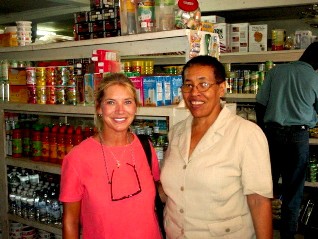
Tonight from the boat we can hear the drum beat of reggae music and the wail of sirens and we suspect that the revolution is underway. Hey what about " The Isle of Slack". Unfortunately the weather was just right for our next leg to Antigua and we were forced to depart. We do look forward to our return next year when we will not leave until our mission is complete. We anticipate hearing a great deal over the next few weeks about the developing situation on NPR. It wouldn't surprise me if Bob Edwards didn't find the story so compelling that he would book a suite in the Four Seasons and cover the story himself.
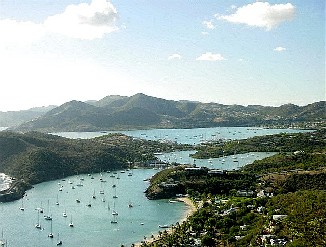
10 March 2003
Falmouth Harbor, Antigua, West Indies
Antigua N 17.0060 W 61.4666
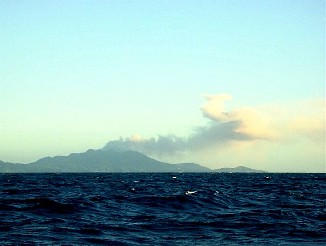
We sailed from Nevis to Antigua on an overnight sail. Because of the prevailing easterly winds, guide books suggest that boats sail south to Montserrat or even to Guadeloupe first and then back track to Antigua, making the trip something over 100 miles. Since Antigua lies due east of Nevis common sense would tell you that the 40 mile passage would be difficult and it was. The winds were around 20 knots and we sailed to Redondo Rock and there we could see the volcano of Montserrat spewing ash to the leeward side of the island. When we got within range we headed north for a long tack and the fall of night. In fact we probably sailed the 100 miles with all the tacking but it did give us time to fish.
We have been unsuccessful in our fishing endeavors lately and before leaving Nevis we prepared our gear intent on improving our luck. As we set out I put out the largest lure we had. It had a hook about the size of your fist and the lure itself was the same size as a fine catch on Giest Reservoir in Indianapolis. The reel had been fitted with new line and we set back in anticipation. I also set out a hand line made of shock cord and for the first time ever we got a hit. Another barracuda hauled to boat side. With a great deal of struggle, on his behalf, and no swivel on the leader it broke and he took off with the lure. Later at dusk we were hand steering close to the wind in order to make some progress east to our destination and when the wind shifted we backh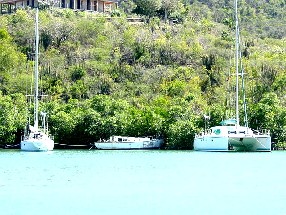 auled the jib. By the time we got things straightened out the reel was empty of line and the super size lure was gone. I never thought the knot to tie the line to the reel would be important but now I know it is. Our spirits were still good as night fell and I rigged a red and black " No Alibi" Dolphin bait and put a chemical light about three feet above the artificial lure. These lights are used by swordfish fishermen in deep water but I thought it was a neat idea even if we don't have a down rigger. The green light danced in the blackness of the ocean for several hours until late at night as we sat in the cabin, Rene and I were amazed to see a streak of green heading perpendicular to our course. It ran for at least 50 yards before I could get to the rod where I found nothing. Absolutely nothing. A bad knot? A kink in the line or leader? A hit on the light that tore the leader free? Well so much for the fish stories. The bible of fishing from a cruising boat is adeptly titled The Cruiser's Handbook of Fishing by Scott and Wendy Bannerot. In the book the authors state that 90% of the fish are caught by 10% of the fishermen. We are not serious about fishing and mostly we do it for the entertainment but now it's starting to get personal and I'm referring more and more to the text. auled the jib. By the time we got things straightened out the reel was empty of line and the super size lure was gone. I never thought the knot to tie the line to the reel would be important but now I know it is. Our spirits were still good as night fell and I rigged a red and black " No Alibi" Dolphin bait and put a chemical light about three feet above the artificial lure. These lights are used by swordfish fishermen in deep water but I thought it was a neat idea even if we don't have a down rigger. The green light danced in the blackness of the ocean for several hours until late at night as we sat in the cabin, Rene and I were amazed to see a streak of green heading perpendicular to our course. It ran for at least 50 yards before I could get to the rod where I found nothing. Absolutely nothing. A bad knot? A kink in the line or leader? A hit on the light that tore the leader free? Well so much for the fish stories. The bible of fishing from a cruising boat is adeptly titled The Cruiser's Handbook of Fishing by Scott and Wendy Bannerot. In the book the authors state that 90% of the fish are caught by 10% of the fishermen. We are not serious about fishing and mostly we do it for the entertainment but now it's starting to get personal and I'm referring more and more to the text.
Antigua, now this is the home of the super sailing yachts. Upon arriving in Antigua, we searched for an anchorage in English Harbor and found it a little o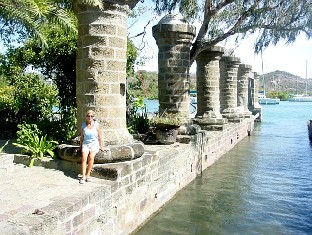 vercrowded. The harbor is quite a unique place in that many insurance companies will extend hurricane coverage to include this very protected anchorage. Boats enter the harbor through a small channel and wind their way back into a harbor of small bays surrounded by mangrove trees which play an integral part when securing for a hurricane. Should a storm be headed for Antigua you need only to run the bow of your boat into the trees, tie off the bow in the mangroves and the stern with several anchors hoping that everything will turn out for the better. A lot of people leave their boats tied to the mangroves and go back home for the hurricane season. The harbor's unique configuration made it militarily defensible in years past and the British established their main naval station, once under the command of British naval hero Lord Nelson. The station has been restored and contains a number of shops and restaurants to lure tourists dollar. vercrowded. The harbor is quite a unique place in that many insurance companies will extend hurricane coverage to include this very protected anchorage. Boats enter the harbor through a small channel and wind their way back into a harbor of small bays surrounded by mangrove trees which play an integral part when securing for a hurricane. Should a storm be headed for Antigua you need only to run the bow of your boat into the trees, tie off the bow in the mangroves and the stern with several anchors hoping that everything will turn out for the better. A lot of people leave their boats tied to the mangroves and go back home for the hurricane season. The harbor's unique configuration made it militarily defensible in years past and the British established their main naval station, once under the command of British naval hero Lord Nelson. The station has been restored and contains a number of shops and restaurants to lure tourists dollar.
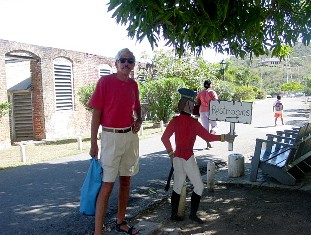
This picture taken at the fort brings to mind the old sailors axiom, "never pass up the opportunity to fill someone else's holding tank".
We ended up anchoring in Falmouth Harbor just a half mile west of English Harbor and are amazed at the size of the beautiful sailing vessels entering and leaving. This harbor is also very well protected but more open for the larger yachts to maneuver. Antigua is noted for it's many beaches and "Antigua Race Week" which is held the last of April. The première events include the Mega Yacht Challenge for sailing vessels over 100 feet and the Classic Yacht Regatta. The docks are full of vessels preparing for the race. Anchor lights for sailing vessels are located at the top of the mast and for vessels over one hundred feet the light is red rather than white. At night the harbor looks like a red light district in Amsterdam..
From our observations it appears that English Harbour has more restaurants and shopping while Falmouth Harbour caters more to the mega yachts with chandleries and marine services. Both have adequate restaurants and we have sampled a few of them.
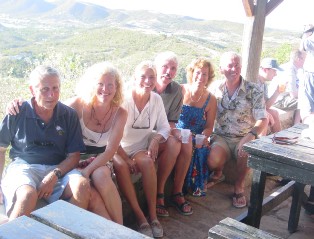 One of the most popular gathering spots in English Harbour is Shirley Heights. On Sundays Shirley has a barbeque of chicken and ribs and live music. One of the most popular gathering spots in English Harbour is Shirley Heights. On Sundays Shirley has a barbeque of chicken and ribs and live music.
Our stay in the harbor has been extended by our starboard engine problem. The starter, or so we believe, had been giving us some problems for the last month and it finally decided to quit. I had onboard a new starter and solenoid, which I installed. I also cleaned all the connections and still nothing. It's always the simple things that get you and I assume this is also some simple thing. Like back in Fort Pierce, we had a back siphon on the port head and for three days Herb and I analyzed the problem and finally tore out the overboard Y value thinking it the culprit. The back flush still persisted. Next under attack was the inflow from the electric head. Still no solution. After three days of lying on the floor of the head in contorted positions, bruised and burnt, yes burned from the boiling water used to fit new sanitary hose on to fittings so tight that they needed to be softened in boiling water to make them fit, we finally found the problem which was an easily reached and appropriately named joker valve. This is a small $1.00 rubber flapper valve that prevents back siphoning. Well anyway I now know the head system backward and forward.
During our wait for help with the engine, we took the bus to St Johns, the capital of Antigua and Barbuda, in search of an engine belt that we have been unable to find elsewhere.
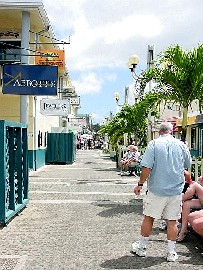 Buses are anything from minivans to fully outfitted buses with air-conditioning. Well we made it in a beat up minivan with the loudest stereo imaginable and every seat full.. But buses are $3.00 round trip per person and cabs are $20.00 one way and the ride was "entertaining". When we arrived in St. Johns we found a cruise liner in town and the touts were out in full force. We did find the engine belts, had ice cream and beer and then returned via bus to Falmouth. Buses are anything from minivans to fully outfitted buses with air-conditioning. Well we made it in a beat up minivan with the loudest stereo imaginable and every seat full.. But buses are $3.00 round trip per person and cabs are $20.00 one way and the ride was "entertaining". When we arrived in St. Johns we found a cruise liner in town and the touts were out in full force. We did find the engine belts, had ice cream and beer and then returned via bus to Falmouth.
Antigua uses the EC, or Eastern Caribbean Dollar as legal tender. One side of a hundred dollar bill pictures a very young Queen Elizabeth II and the other Sir Arthur Lewis. Since you know who QE II is let me tell you about William Arthur Lewis. This noted Nobel Laureate was the first black man to receive this distinction in a category other that Peace and was a noted economists who ended his career as professor emeritus at Princeton. One of his well know areas of study was the economic development of Caribbean countries. Lewis supported internal trade of these countries rather than relying on trade with developed countries as a way to accelerate the economic development, hence his recognition on the EC dollar. The fixed exchange rate is 2.67EC's to 1 USD. The BVI has adopted the US dollar as the coin of the realm due to the high amount of US tourism. The French islands are now utilizing the Euro. The other independent Caribbean islands utilize the EC issued by the Eastern Caribbean Central Bank.
With all the above history and factual material about Antigua you can tell that we have been sitting and waiting for quite some time but that's the way it is with the boating stuff, you're either sailing and wishing you were at anchor or at anchor wishing you were sailing. You can snorkel over to the nearby reef and see every type of reef fish there is along with an occasional stingray, barracuda and lobster. We have been unsuccessful at catching any lobster yet but we continue to try. The show at anchor and the sunsets are quite delightful. As dusk approaches the frigate birds make the first attack on the water and then the brown pelican start to their diving routine. They circle until the sun is to their back and from about thirty feet dive head first into the water where they open their large beaks and swoop in the small fish from the schools swimming in the harbor. This constant pounding from thirty feet eventually takes its toll effecting their eyesight. With poor eyesight they finally lose their ability to hunt and die of starvation. This was told to us by a local and now we watch the pelican ritual with a bit of sadness.
Note: NPR has failed to report on the peaceful Slack uprising in Nevis. Either that or the Kittians have censored the information regarding our revolution. Either way the Slacks on Nevis need your support. You can show your support by sending your cash contributions to me and I will make sure that every dollar will go to a needy Slack.
22 March 2003
Falmouth Harbour, Antigua W I N17.0060 W61.4666
Operation Iraqi Freedom
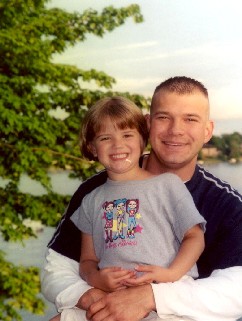
From the first strikes on Iraq we have intently listened to the radio for news of the days happenings or stopped by the coffee bar to watch the updates of the war on TV. In this tourists atmosphere the television is not always tuned to CNN but when we ask they comply. In case you are unfamiliar with our situation our son Josh, who has been in the Army for eight years, has his orders to deploy to the Mideast within 30 days and our son Allen who has only been in the Army for four months departs for Iraq on Saturday March 29th. Although we have made a few acquaintances and are in touch with some of the local trades and we are never sure what they really think of the war. But Antigua was once a British owned colony and is still heavily occupied by th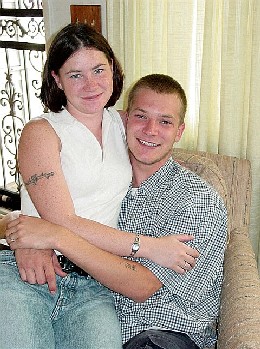 e British. I think we are all in agreement that Sadam's reign must end and we all want that result as quickly and safely as possible. The locals believe that the threat of war has caused a slowdown in the US economy and this has been felt in Antigua. Even though the number of cruisers and boats look plentiful to us, we have been told that this is a very slow season. This typically is the busy season here in the harbour with the preparation for race week. After race week boats depart since most insurance companies insist that your boat be below 12.3N during the hurricane season. So most of the cruisers we have met are either enroute north to the States or south below the required latitude. We are headed south. e British. I think we are all in agreement that Sadam's reign must end and we all want that result as quickly and safely as possible. The locals believe that the threat of war has caused a slowdown in the US economy and this has been felt in Antigua. Even though the number of cruisers and boats look plentiful to us, we have been told that this is a very slow season. This typically is the busy season here in the harbour with the preparation for race week. After race week boats depart since most insurance companies insist that your boat be below 12.3N during the hurricane season. So most of the cruisers we have met are either enroute north to the States or south below the required latitude. We are headed south.
We have not seen much of Antigua but where we are located provides us with all we need. We are anchored at Pigeon Beach and each night we see the sunset behind the volcano spewing from Montserrat, in the nearby reef you can identify a plethora of different reef fish, sting rays, lobster , barracuda and so on. The marina has a movie rental for $6.00EC (or a little over two dollars) and a variety of small restaurants and bars. But we would rather be on the move and we miss the daily sailing and exploring new places.
As a result of our starter problem, we had to have the starboard engine pulled to find what caused the engine to freeze up. What they found was that a small screw had jammed the flywheel. It's one of those good news bad news deals with the fact that it could have been much worse. Our computer also decided to have a memory failure and thanks to Hank of Computer Services the bad memory board was found and replaced. Now Hank is an interesting guy. An American who came to the island some 31 years ago with his family in a 85 foot sailboat which he chartered. Today, three wives later and an aging techie, he declares that he couldn't think of a better place to die. I guess that's one way of looking at it.
Tomorrow we will buy a larger US flag as a show of our support of our troops and their families and for the citizens of Iraq in hopes that the hostilities not last too long and that we can help rebuild their country to become a productive member of the world community. Let's all pray that our soldiers return to their families safely.
Back Next
|